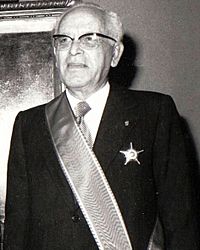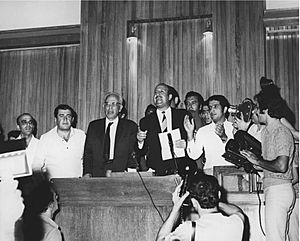Suleiman Frangieh facts for kids
Quick facts for kids
Suleiman Bey Frangieh
OM, ONC
|
|
|---|---|
|
سليمان بك فرنجية
|
|

Frangieh in 1974
|
|
| 5th President of Lebanon | |
| In office 23 September 1970 – 22 September 1976 |
|
| Prime Minister | Saeb Salam, Amin al-Hafez, Takieddin el-Solh, Rachid Solh, Nureddine Rifai, Rashid Karami |
| Preceded by | Charles Helou |
| Succeeded by | Elias Sarkis |
| Personal details | |
| Born | June 15, 1913 Zgharta, Beirut Vilayet, Ottoman Empire |
| Died | July 23, 1992 (aged 82) Beirut, Lebanon |
| Political party | Marada Movement (1978–1992) |
| Spouse | Iris Handaly (1913-1995) |
| Children | Antoine (1941–78), Robert Frangieh Other three children |
| Relatives | Hamid Beik Frangieh (brother) |
| Occupation | Politician, entrepreneur |
| Religion | Maronites |
Suleiman Kabalan Frangieh (Arabic: سليمان فرنجية, June 15, 1910 – July 23, 1992) was an important Lebanese politician. He belonged to the Maronite Christian community. Frangieh served as the President of Lebanon from 1970 to 1976. His last name is sometimes spelled Frangié, Franjieh, or Franjiyeh.
Contents
Suleiman Frangieh: A Lebanese Leader
Early Life and Family
Suleiman Frangieh was born in Zgharta, Lebanon, on June 15, 1910. His family was one of the most important Maronite families in the area. They were well-known landowners.
His father, Kabalan Suleiman Frangieh, was a politician. He served as a district governor and a member of Parliament. Suleiman's grandfather, Suleiman Ghnatios Frangieh, was also a district governor. His brother, Hamid, became a foreign minister.
Suleiman Frangieh received his education in Antoura, near Beirut. He also studied in Tripoli and Beirut. Before starting his political career, he worked in the export-import business in Beirut.
Becoming President
In 1960, Suleiman Frangieh was elected to the Lebanese Parliament. He took over the seat previously held by his older brother, Hamid. Suleiman became the leader of his family's political group. He was re-elected to Parliament in 1964 and 1968.
Before becoming president, he held several important government jobs. He was the minister of post, telegraph, and telephone (1960–1961). He also served as minister of agriculture (1961), interior (1968), justice (1968–1969), and economy (1968–1970).

On September 23, 1970, Frangieh was elected President of Lebanon. This election was very close and quite surprising. He won because Kamal Jumblatt and his supporters in Parliament changed their votes at the last minute. Frangieh was seen as a candidate who could bring different groups together. His election was a change from the previous governments.
The election had three rounds of voting:
- Round 1: 99 members of Parliament voted for 5 candidates, but no one got a majority.
- Round 2: 99 members voted for 2 candidates, and both got 50 votes. One vote was found to be fake, so this round was cancelled.
- Round 3: 99 members voted again. Kamal Jumblatt asked one of his supporters to vote for Frangieh. This made Suleiman Frangieh the legal President.
Sabri Hamadeh, who was the Speaker of Parliament, did not want to announce the winner because of the very small difference in votes. However, Michel Georges Sassine, the Deputy Speaker, stepped in. He used his power to officially announce Frangieh as President. Frangieh's term as president lasted until September 22, 1976.
Leading During Difficult Times
The Lebanese Civil War started on April 13, 1975. As president, Frangieh tried to end the conflict. On February 14, 1976, he introduced a "Constitutional Document." This document suggested giving more power to the prime minister. It also proposed an equal share of power between Christians and Muslims in Parliament. This would reduce the power of the Maronites. Many politicians and religious leaders supported it, but it did not stop the war.
In May 1976, Frangieh invited Syrian troops to Lebanon. This happened early in the Civil War. Many Lebanese Christians supported this idea. They hoped Syria could help stop the fighting and protect Christians. Some people believe his actions contributed to Lebanon's descent into war.
During the war, Frangieh had his own militia called the Marada Brigade. His son, Tony Frangieh, led this group. Suleiman Frangieh was part of the Lebanese Front at first. This was a group of Christian politicians and militia leaders. But in 1978, he left the group because he favored Syria.
In June 1978, his son Tony was killed. Tony's wife and young daughter were also killed. This event is known as the Ehden massacre. After this, the Frangieh family's power decreased. Suleiman Frangieh was very sad and vowed to get revenge.
Later Years and Legacy
Suleiman Frangieh remained a friend and ally of Syria. In July 1983, after Amine Gemayel became president, Frangieh joined Rashid Karami and Walid Jumblatt. They formed a group called the National Salvation Front. This group was supported by Syria. They challenged President Gemayel's rule.
Later, Syria tried to help Frangieh become president again in 1988. However, the Parliament could not get enough members to vote. This was because some Christian members boycotted the session. Frangieh had announced his plan to run for president on August 17, 1988.
Suleiman Frangieh had five children with his wife, Iris Handaly. They had two sons, Tony and Robert, and three daughters, Lamia, Sonia, and Maya. His daughter Sonia married Abdullah Al Rasi, who was a doctor and politician.
His grandson, Suleiman Frangieh Jr., became a politician too. He served as Minister of Public Health and Minister of Interior.
People in Lebanon sometimes called Suleiman Frangieh "the tough man." This was because he was known for his strong opinions and firm approach.
Death
Suleiman Frangieh passed away on July 23, 1992. He was 82 years old. He died in a hospital in Beirut after being sick for three weeks. He had pneumonia and other health issues. He was buried in Ehden, next to his son Tony.
Images for kids
See also
 In Spanish: Suleiman Frangieh para niños
In Spanish: Suleiman Frangieh para niños
 | Sharif Bey |
 | Hale Woodruff |
 | Richmond Barthé |
 | Purvis Young |



